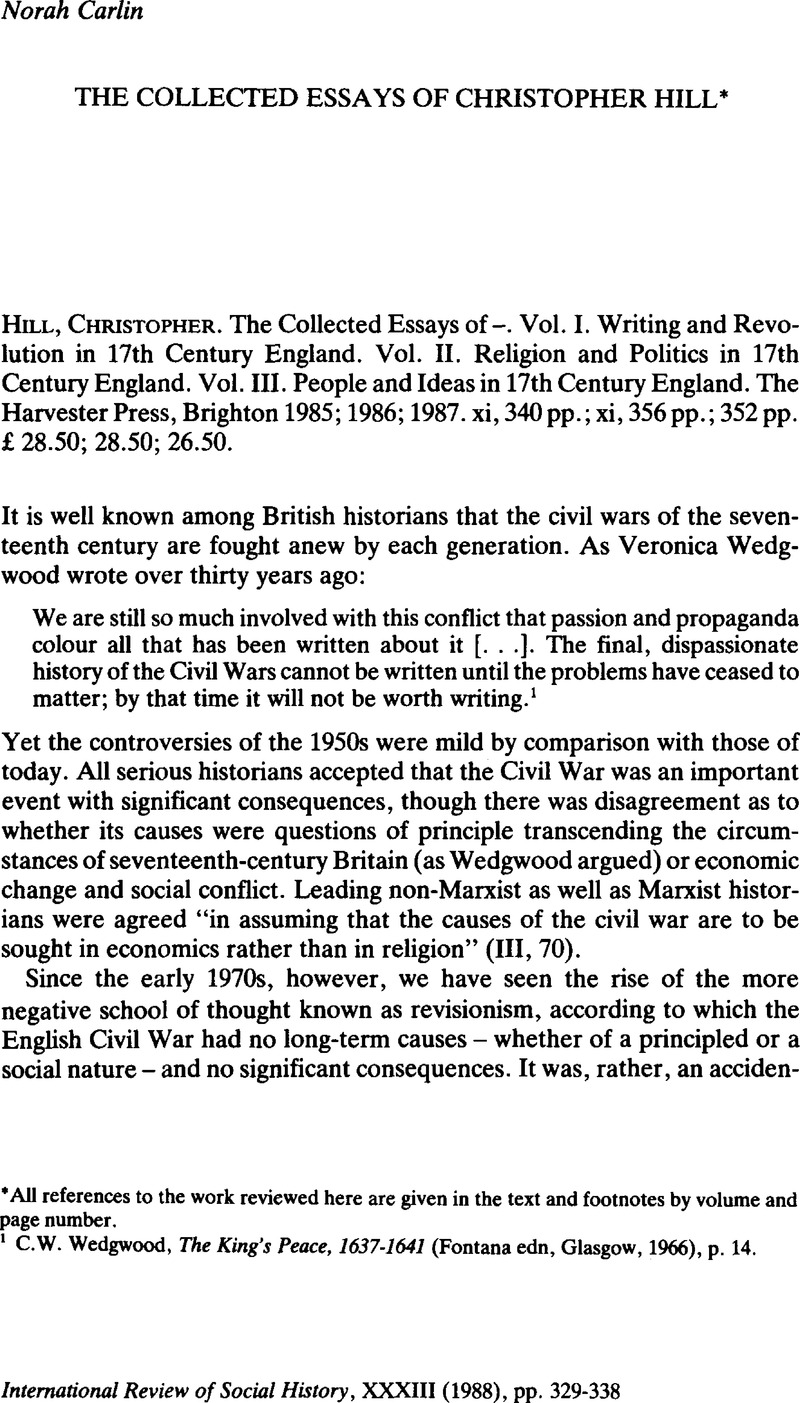No CrossRef data available.
Published online by Cambridge University Press: 18 December 2008

1 Wedgwood, C.W., The King's Peace, 1637–1641 (Fontana edn, Glasgow, 1966), p. 14.Google Scholar
2 Anthony, J. Fletcher, The Outbreak of the English Civil War (London, 1981), pp. xix–xxx, 407–419.Google Scholar
3 Alan, Everitt, The Local Community and the Great Rebellion (London, 1969).Google Scholar
4 J[onathan] Clark, C. D., Revolution and Rebellion: state and society in England in the seventeenth and eighteenth centuries (Cambridge, 1986);CrossRefGoogle ScholarDavis, J. C., Fear, Myth and History: the Ranters and the Historians (Cambridge, 1986), pp. 126–137. Kenneth Baker, Conservative Minister of education, has told the press that the latter was his favourite book of 1986.Google Scholar
5 Peter, Laslett, The World We Have Lost — further explored (London, 1983), p. 198.Google Scholar
6 For an account of the circumstances in which Hill left the Communist Party, see MacEwen, M., “The day the Party had to stop”, Socialist Register, 1976.Google Scholar
7 Mark, Kishlansky, “Desert Island Radicals”, Times Higher Education Supplement (London), 7 09 1984.Google Scholar The tone of this review of Hill's The Experience of Defeat (London, 1984)Google Scholar may be gathered from the following quotation: “But the centre of the book remains the cranks, crackpots, screwbafis and fanatics, the flutters and kooks who appear in the wake of every genuine movement for social reform and who become the principal barrier to lasting change.”
8 Though Hill refers to the outcome of the English Revolution as “closer to the Prussian model than the French” (III, 113), he recognizes elsewhere that the Prussian and Japanese revolutions “from on top” could only happen after capitalist dominance had first been established in other countries “from below” (III, 123).
9 For a similar interpretation, see Michael, Mullett, Radical Religious Movements in Early Modern Europe (London, 1980).Google Scholar
10 Clark, , Revolution and Rebellion, p. 108.Google Scholar
11 Keith, Wrightson, English Society 1580–1680 (London, 1982), p. 131.Google Scholar
12 For detailed examples, see Margaret, Spufford, Contrasting Communities: English villagers in the sixteenth and seventeenth centuries (Cambridge, 1974), pp. 3–164;Google ScholarKeith, Wrightson and David, Levine, Poverty and Piety in an English Village; Terling, 1525–1700 (London, 1979), pp. 19–42.Google Scholar
13 Hill does not give the source. But the question of the transformation of feudal rent into capitalist rent is discussed by Marx, in Economic and Philosophic Manuscripts of 1844 (ed. J. Struik, Disk, New York, 1964), pp. 92–105, 120–127; and in Capital, Vol. III (Moscow, 1966), pp. 782–813.Google Scholar
14 Christopher, Hill, Puritanism and Revolution (Panther edn, London, 1968), pp. 154–193.Google Scholar
15 Richardson, R. C., The Debate on the English Revolution (London, 1977), p. 97.Google Scholar
16 For another example, see III, 118.
17 Ferdinand, Mount, The Subversive Family: an Alternative History of Love and Marriage (London, 1982).Google Scholar
18 William, Lamont, “The Left and its Past: revisiting the 1650s”, History Workshop 23 (1987), p. 162.Google Scholar This is borne out by the contents of Donald Pennington and Keith, Thomas, Puritans and Revolutionaries: essays in seventeenth-century history presented to Christopher Hill (Oxford, 1978).Google Scholar
19 For the history of left groupings in British historiography, see Eric, Hobsbawm, “The Historians' Group of the Communist Party”, in Cornforth, Maurice (ed), Rebels and their Causes: essays in honour of A. L. Morton (London, 1978);Google ScholarSchwartz, B., “The “people” in history: the Communist Party Historians' Group”, in Johnson, R. et al., Making Histories (London, 1982), pp. 44–95;Google ScholarHill, C. et at., “Past and Present: origins and early years”, Past and Present, 100 (1983), 3–14;CrossRefGoogle ScholarRaphael, Samuel, “History Workshop, 1966–80”, in Samuel, Raphael (ed.), People's History and Socialist Theory (London, 1981), pp. 410–417.Google Scholar